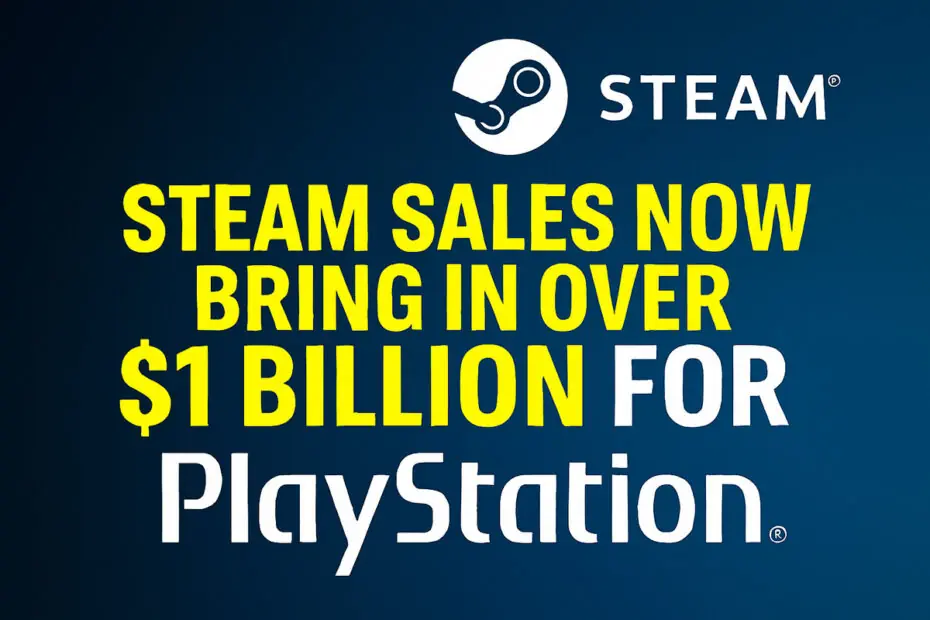Sony’s presence on Steam has so far resembled a cautious experiment, with the company mainly porting older, single-player PlayStation games long after their console lifecycles have ended. That approach may soon be tested. If Valve delivers widely adopted hardware that runs Steam natively, effectively creating a standalone platform, Sony could face fresh pressure to rethink and expand its PC strategy.
What used to be an easy way for Sony to make some extra cash from older games could suddenly pull the company into someone else’s turf, complete with different hardware, a different crowd, and new pressure to launch games on day one.
The money side of things is no small deal. Steam normally takes 30% of a game’s sales, but that cut shrinks to 25% after the game makes $10 million, and drops again to 20% once it hits $50 million. For big hits, that difference adds up fast.
To see the real impact of PlayStation Studios’ games on Steam, we have to look at how the fees work. Alinea believes these titles have brought in roughly $1.5 billion so far. The smaller games stay stuck with the full 30% cut, but Sony’s heavy hitters race past the thresholds, letting most of their earnings slip into the cheaper 25% and 20% brackets.
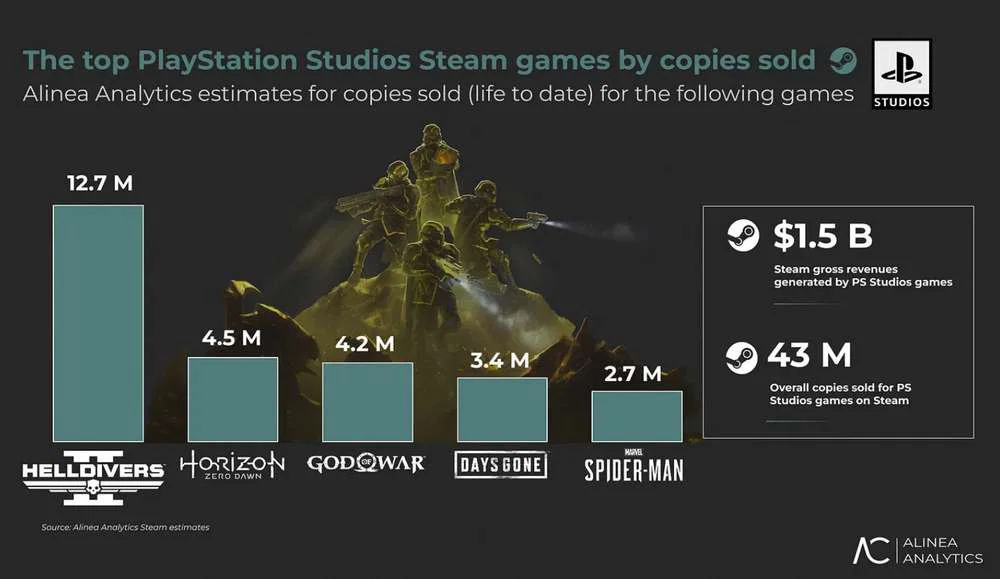
After accounting for Steam’s tiered fees, Alinea estimates that Valve has taken in more than $350 million, leaving Sony with just under $1.2 billion in net revenue. The analysis is based on roughly 43 million copies sold of PlayStation-published titles on the platform.
Among the roughly 43 million units sold, one title outperforms the rest: Helldivers 2. Alinea estimates the co-operative shooter has shipped approximately 12.7 million Steam copies, yielding around $400 million in gross revenue and firmly establishing it as Sony’s top-performing PC launch.
Its success is driven by a mix of elements, including a replayable PvE co-op format, a launch period with little direct competition, and strong day-to-day engagement. Elliott adds that the game has sold over twice as many copies on Steam as on the PlayStation 5, indicating a strong PC demand for cooperative games built around ongoing play rather than single-player experiences.
And it’s not just Helldivers 2. A bunch of Sony’s single-player hits have found real traction on PC. Horizon Zero Dawn has reportedly sold around 4.5 million copies on Steam, pulling in about $170 million. God of War (2018) isn’t far behind with roughly 4.2 million copies and close to $150 million earned. Even Days Gone, which had a pretty mixed reception on console, did better than expected on PC, selling around 3.4 million copies and bringing in about $108 million.
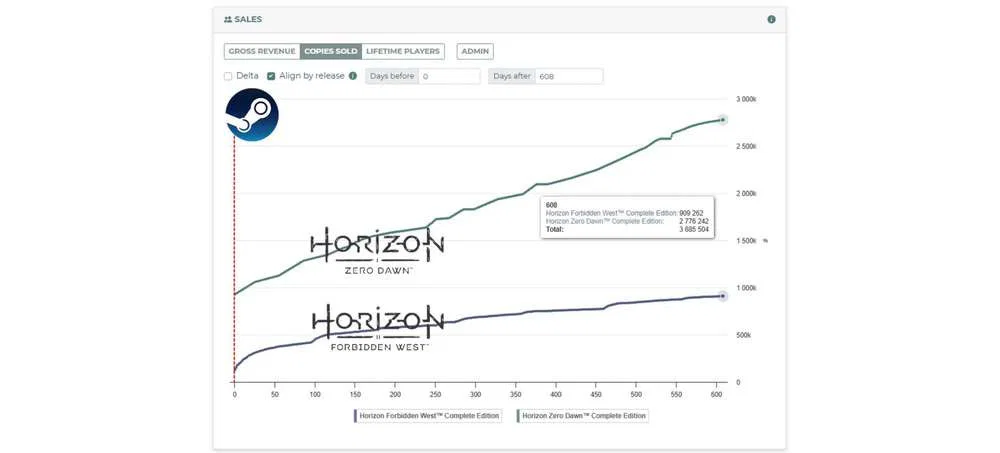
Spider-Man Remastered moved roughly 2.7 million copies on PC, bringing in around $116 million. Features like ultrawide support and ray-traced reflections really helped it click with PC players who love pushing their hardware.
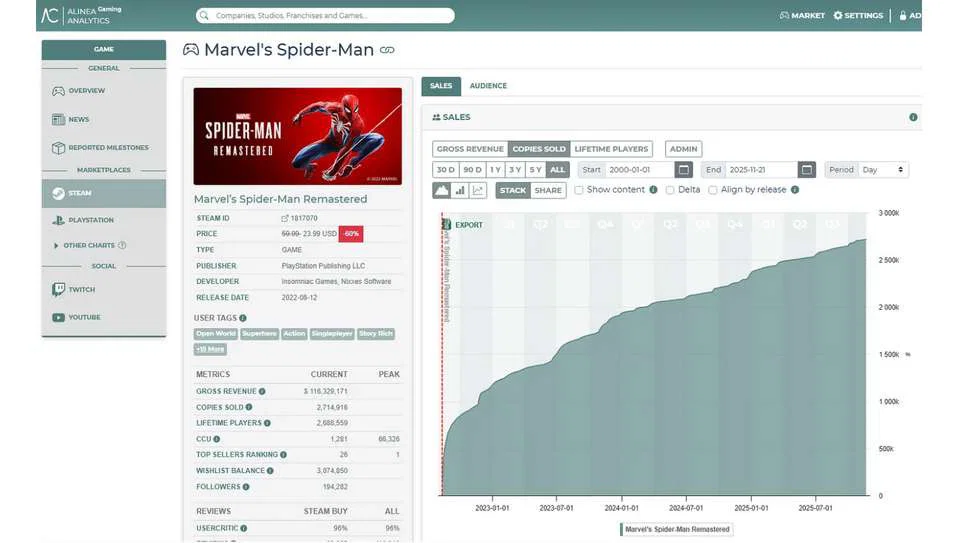
Those first PlayStation-to-PC ports definitely had a “new and shiny” advantage. Games like Horizon Zero Dawn, Days Gone, and God of War felt like big events for PC players who’d never had them before. But things look different now that more series are coming over. According to Alinea, God of War sold about 2.5 million Steam copies in its first 427 days, which is over two-and-a-half times what Ragnarök managed in the same stretch.
The same trend appears in the Spider-Man series. After 294 days on Steam, Marvel’s Spider-Man sold an estimated 1.4 million copies, more than twice the sales of Marvel’s Spider-Man 2 during the equivalent period.
Even with the slower start, it’s not like these ports are tanking. Spider-Man 2 has already made around $32 million on Steam, and God of War Ragnarök’s PC version is sitting at roughly $45 million.
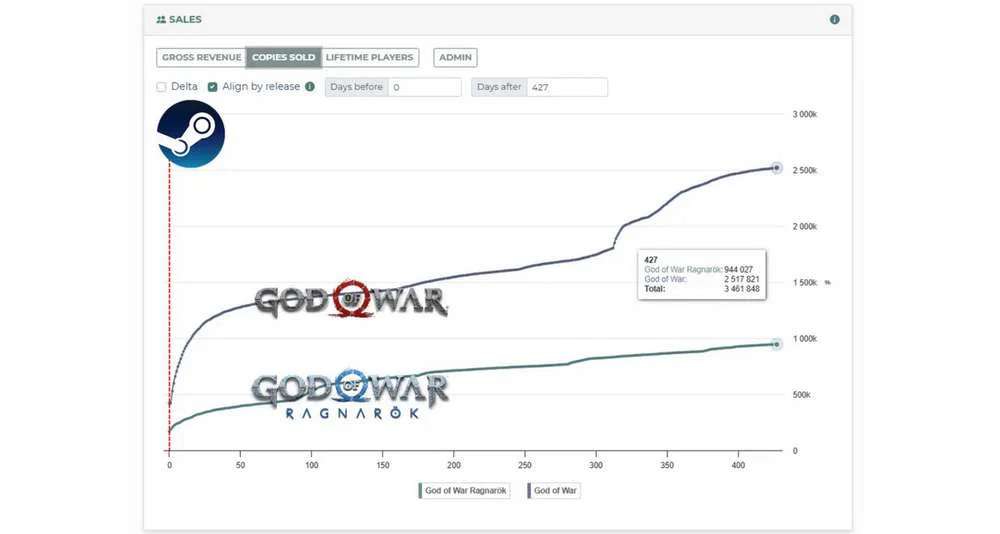
The data suggests not a downturn but a strategy reaching a more mature phase. Games that align tightly with Steam’s player profile, exemplified by Helldivers 2 and its co-op, live-service model, can still achieve success. In contrast, subsequent releases in major single-player franchises are trending toward more measured yet consistently profitable performance.
Hardware remains an important factor to watch. Elliott mentions that Valve could reintroduce a Steam Machine-type product, which would position Steam as a complete platform rather than solely a storefront. This shift could influence how publishers like Sony plan their future PC releases.
Maybe you would like other interesting articles?

